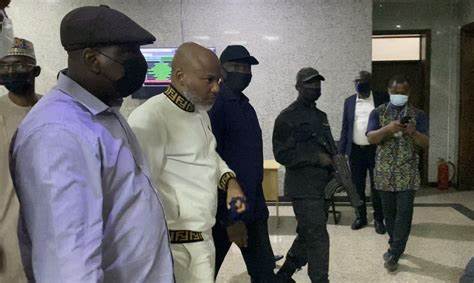Nnamdi Kanu, the leader of the Indigenous People of Biafra (IPOB) currently in government custody, has vowed to appeal the dismissal of his fundamental rights lawsuit against the Nigerian government. The suit, filed in a Federal High Court in Abuja, was struck down by Justice James Omotosho on Monday, citing a lack of evidence from Kanu to support his claims the CRUX NEWS reports.
Kanu Accuses DSS of Infringing on Legal Rights
Kanu, who has been detained since his 2021 re-arrest in Kenya, alleged that Nigeria’s Department of State Services (DSS) violated his right to a fair trial. He claimed that DSS officials purposefully obstructed his ability to prepare a proper defence by:
- Limiting Communication with Lawyers: Kanu asserted that the DSS restricted the amount of time and privacy afforded to his interactions with his legal team. This limited communication could make it difficult for the lawyers to effectively strategize for Kanu’s ongoing treason trial, potentially hindering their ability to identify and challenge weaknesses in the prosecution’s case or explore potential defences.
- Eavesdropping on Meetings: He further accused the DSS of eavesdropping on his confidential conversations with his lawyers. This raises concerns about attorney-client privilege, a cornerstone of legal systems around the world. The attorney-client privilege protects open and honest communication between a defendant and their lawyer, which is essential for building a strong defence. If a defendant believes their conversations are being monitored, they may be less likely to disclose crucial information to their lawyer, potentially jeopardizing their case.
- Disallowing Note-Taking: Kanu’s lawsuit also claimed that the DSS prevented his lawyers from taking notes during pre-trial meetings. This could make it difficult for the lawyers to keep track of important details and discussions, potentially hindering their ability to effectively represent Kanu in court. Detailed notes are crucial for lawyers to plan their legal strategy, prepare questions for witnesses, and ensure they don’t miss any critical pieces of evidence.
READ ALSO: https://thecrux.com.ng/abia-rep-appeals-to-buhari-for-nnamdi-kanus-release/
Seeking a Declaration of Rights Violation
Kanu’s lawsuit sought a formal declaration from the court acknowledging these alleged actions by the DSS as violations of his fundamental right to a fair trial, specifically the right to be represented by legal counsel of his choice and the right to confidential communication with his lawyers. These rights are enshrined in various international human rights instruments, including the African Charter on Human and Peoples’ Rights, to which Nigeria is a signatory.
Judge Rules Against Kanu Due to Lack of Evidence
However, Justice Omotosho dismissed the lawsuit, finding that Kanu failed to present sufficient evidence to substantiate his claims. This lack of concrete proof proved to be the undoing of Kanu’s case.
Appeal Planned by Defense Team
Despite the setback, Kanu’s lawyer, Aloy Ejimako, has confirmed their intention to appeal the court’s decision. This suggests that Kanu and his legal team will continue their fight to have the alleged violations of his rights addressed.
Kanu’s Long-Running Legal Saga
Kanu’s current trial for treason stems from his activities promoting Biafran independence. Initially arrested in 2015, he jumped bail and fled Nigeria in 2017. Following his capture in Kenya in 2021, he was brought back to Nigeria to face trial. This latest lawsuit dismissal adds another chapter to Kanu’s lengthy legal saga, which is likely to continue with the planned appeal.










